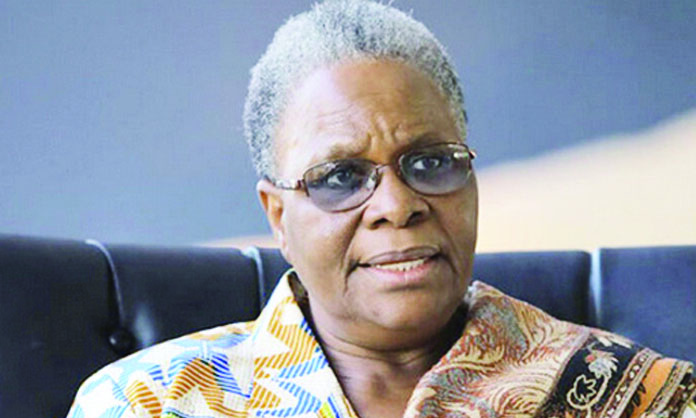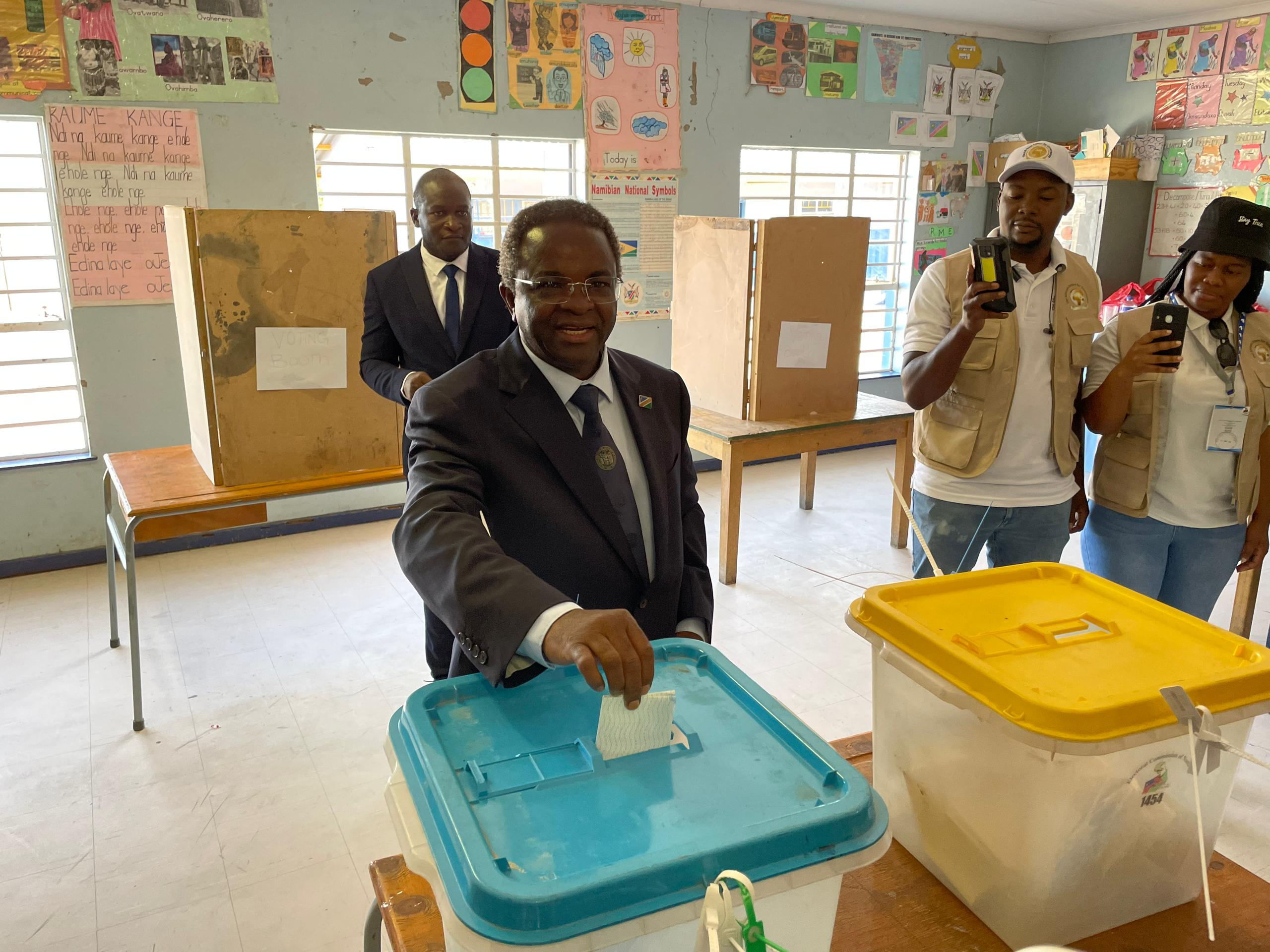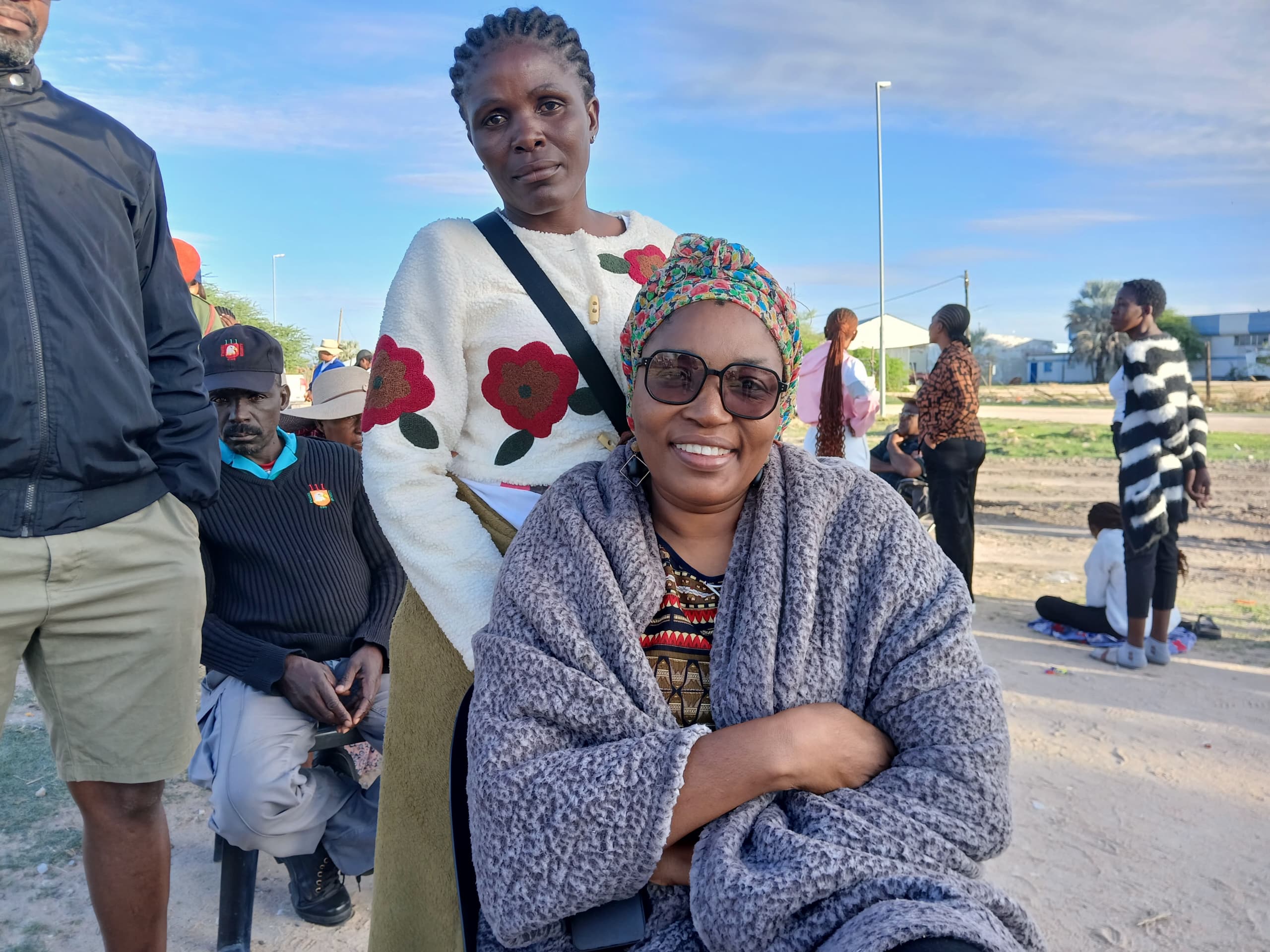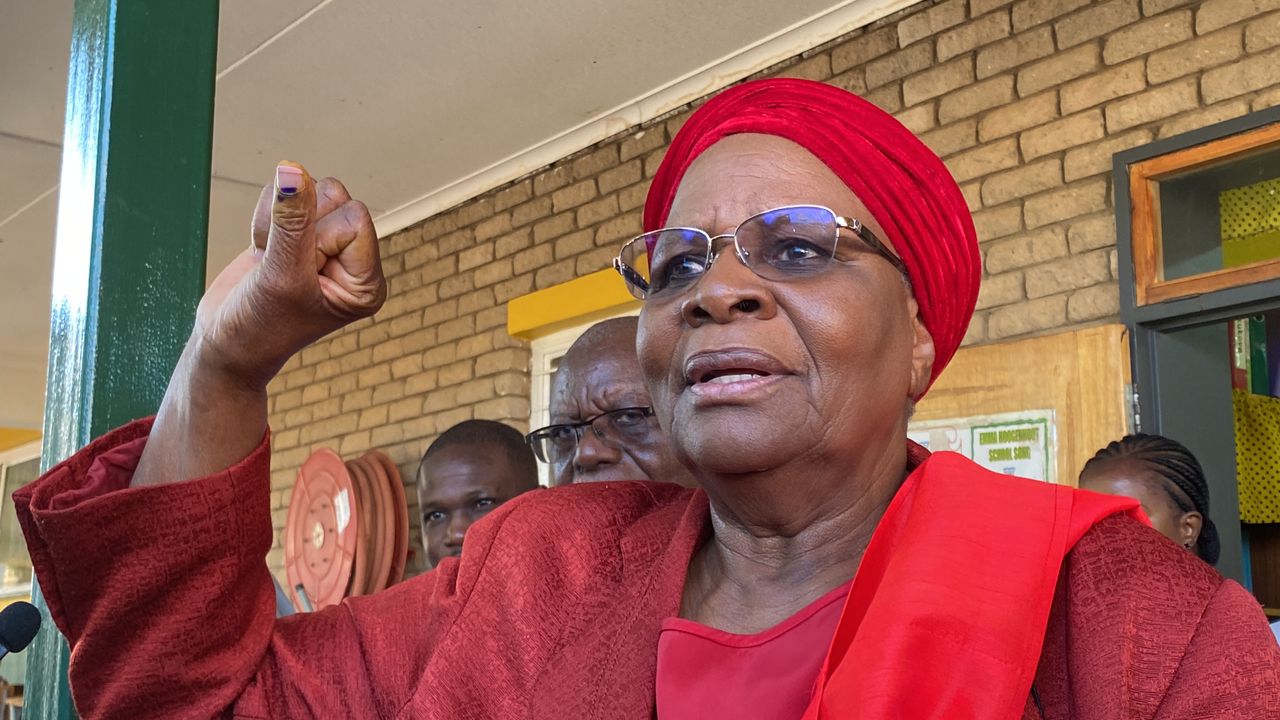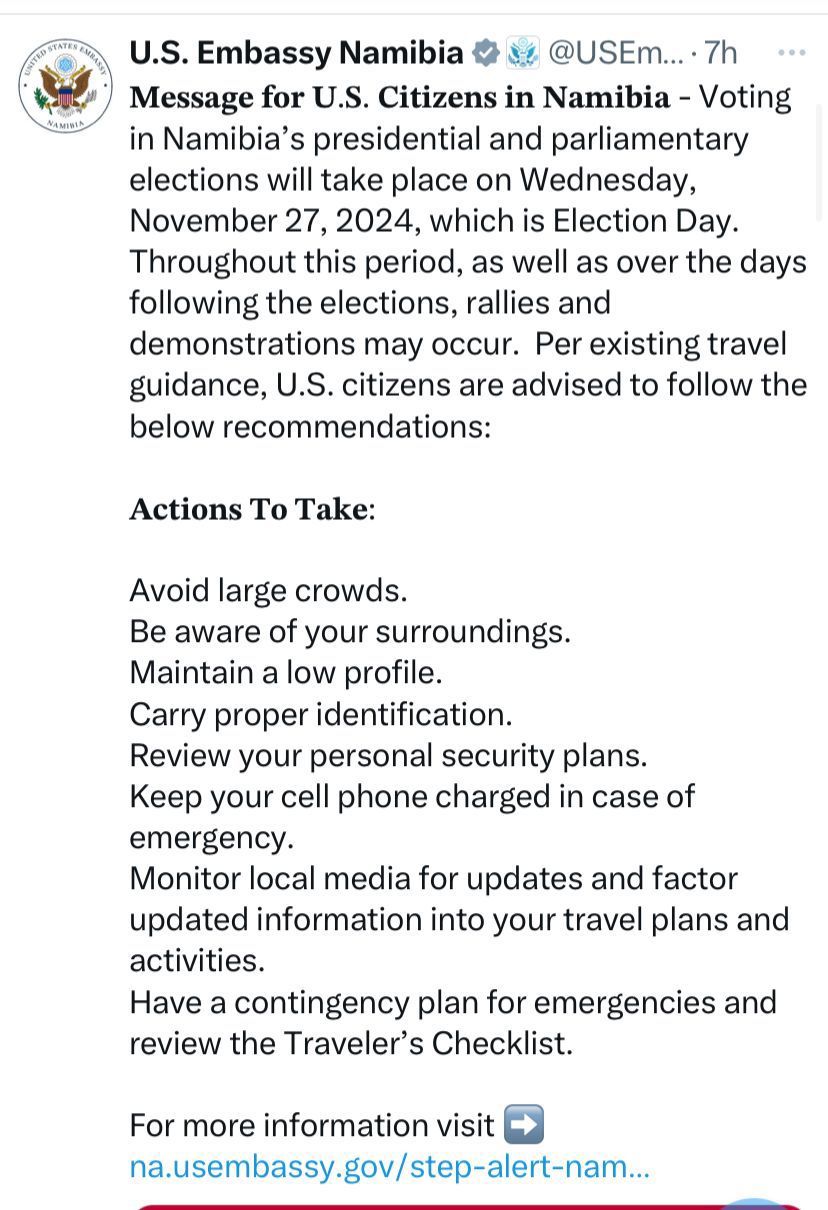Esteemed citizens and valued partners, as we bid farewell to the year that was, I am deeply honoured and pleased to reflect upon the significant strides we have taken together in the realm of international relations and cooperation.
In navigating this ever-evolving world, our bilateral and multilateral engagements have not only grown stronger, but have also delved deeper, fostering mutual partnerships that promise exciting prospects for Namibia’s economic development and growth.
However, amid the successes we have registered, we remain cognisant of the challenges and emerging threats unfolding on the global stage, among others natural disasters fuelled by climate change and the proliferation of conflicts claiming innumerable lives.
In solidarity with grieving nations and families, we extend our heartfelt condolences and sympathies, especially during this season during which time with family should take prominence.
The past year has been marked by active diplomacy, including official visits, meetings, and strengthened cooperation with various nations.
Bilateral visits were undertaken in 2023 by his excellency the president, vice president, prime minister, ministers, senior government officials and myself to various countries, such as South Africa, Angola, Botswana, Algeria, Poland Belgium, Cuba, Russia, the United States (US) and Venezuela.
Similarly, we also had inbound visits at head of state and ministerial level, including from Finland, Cuba, The Netherlands, Denmark, Sierra Leone, Tanzania, South Africa, Estonia, Slovenia, the US and Japan. Through these visits and our daily interactions with other states and international organisations, our bilateral cooperation is bolstered and we also underscore our commitment to shared goals.
During our chairing of the Southern African Development Community (SADC) Organ on Politics, Defence and Security Cooperation, Namibia provided leadership in strengthening institutions for peace in the region.
Navigating the complexities of the political landscape required our unwavering commitment to consistency in directing the activities of the organ.
During the tenure of our chairship, Namibia successfully led the SADC electoral observation missions in Angola in August 2022 and in the Kingdom of Lesotho in October 2022. In my capacity as chair of the ministerial committee of the organ, I implemented the summit decision to engage the United Nations (UN) secretary general on the margins of the UN General Assembly (Unga) in September 2022 to explore all avenues to support efforts towards improving the security situation in eastern Democratic Republic of Congo (DRC).
Due to equally important engagements I was, however, unable to meet the UN secretary general, thus his excellency Stanley Kakubo, the minister of foreign affairs of Zambia and the deputy chair of the organ, graciously stood in for me and met with the deputy secretary general for peacekeeping and operations, Jean-Pierre Lacroix, and for that I extend my gratitude to him.
Similarly, I was again delegated by SADC Organ Troika plus SADC Troika and Force Intervention Brigade troop-contributing countries to engage the UN secretary general to seek further clarity, and that meeting between myself and the UN secretary general took place at the UN headquarters in June 2023.
During our engagements with the UN, it was agreed that cooperation between the UN, SADC and all involved in the DRC is important for a durable solution.
As part of C-10, Namibia has been participating in meetings, both at ambassadorial, ministerial and head of state level, aimed at canvassing support for the African Union (AU) Common African Position on UN Security Council Reform as reflected in the Ezulwini Consensus and Sirte Declaration.
Thus on 23 November 2023, his excellency Dr Nangolo Mbumba, the vice president of Namibia, assisted by senior government officials, participated in the AU Committee of Ten (C-10) Summit in Oyala, Equatorial Guinea. Similarly, Namibia continues to play a crucial role as a member of the AU Peace and Security Council in seeking solutions to problems related to conflicts in Africa, and cooperates with other AU members in advancing peace and strengthening the peace infrastructure in Africa.
Our national interests are also promoted through binational commissions or joint commissions of cooperation and diplomatic consultations, which the ministry held with South Africa, Cuba, Tanzania, India, Poland, Egypt, Zambia, Brazil, Sierra Leone and Spain, as well as the Russian-Namibian Inter-Governmental Commission on Trade and Economic Cooperation.
We engage in such active diplomacy for the sole purpose of building as many smart partnerships as feasible and to support the priority areas of the government as outlined in Vision 2030, the fifth Namibia Development Plan (NDP5), and the first and second Harambee Prosperity Plan (HPPI and HPPII): high and sustained economic growth, poverty eradication, increased income equality and employment creation, improved health and education for our people, infrastructure development, as well as to diversify Namibia’s options in terms of creating a web of political support linkages that give access to trade, investment, transfer of technology and many other valuable inputs, such as tourism inflow, that generate direct benefit for the people of Namibia.
I must underscore that our national interests constitute an overriding factor in our bilateral relations, allowing Namibia to exercise her sovereign right when conducting business within the parameters of these relations.
It has been the ministry’s priority that we continue to maintain and develop harmonious and peaceful co-existence with our neighbours.
Our relations with our neighbours remain sacrosanct as we continue to advocate and prioritise the realisation of economic value chains within the context of our regional economic integration agenda under the frameworks of the SADC Revised Regional Indicative Strategic Development Plan (RISDP) for 2020 to 2030 and the SADC Industrialisation Strategy and Roadmap (SISR) for 2015 to 2063.
We will continue to prioritise the full implementation of the joint Infrastructural projects and programmes connecting our neighbouring countries, such as the one-stop border post (OSBP) with Botswana, Angola and Zambia, the Trans-Kalahari railway line project, and the rolling out of national identity cards with Zambia for entry purposes.
We will also play our part as good neighbours in the utilisation and preservation of our shared natural and water resources.
In the coming year, the ministry will host several counterparts from the region and around the world, and several bilateral and multilateral visits have already been arranged.
We understand well that the world is burdened with conflicts, geopolitical competitions, tensions and calls for institutional reforms and financial recalibration.
The staff members of the ministry and I will continue to critically analyse the best ways to manage the politics of international relations in the aforementioned context, and how to amplify our voice to demand equity, justice and fairness in multilateral institutions so that they can function better and provide equal opportunities to our people, especially women, girls, boys and young people in general.
The restoration of peace and stability in the eastern DRC and the Cabo Delgado province of Mozambique therefore remain in our focus. Namibia appreciates the support from our regional and international partners to this end.
The challenges presented by the conflicts in Ukraine, Palestine, Sudan, Niger, Mali, Guinea, Burkina Faso and Somalia underscore the imperative for global cooperation in the pursuit of lasting peace and stability.

Namibia staunchly upholds the principles of resolving conflicts through peaceful means and dialogue. This is a commitment that remains unwavering in the face of complex geopolitical dynamics.
Namibia, as a child of international solidarity, through the International Women’s Peace Centre established in 2019, maintains her contribution to the enhanced implementation of the landmark UN Security Council Resolution 1325 on Women, Peace and Security (WPS) and the rest of the WPS agenda.
The majority of conflicts around the world involve multiple state and non-state actors, with a divergence of interests which need to be managed by bringing all the actors together to resolve their conflicts through peaceful means. While the international community as a whole has a role to play, the permanent members of the UN Security Council have a greater role to ensure that peace and security prevails in all regions of the world.
When the permanent members remain undecided, or pursue their limited, ulterior foreign policy objectives, the collective goals of the international community are undermined.
It is for these reasons, among others, that Namibia as one of the AU Committee of Ten (C-10) member states continues to advocate for the reform of the UN Security Council by pushing for permanent seats and additional non-permanent seats for Africa on the UN Security Council.
Namibia also actively engages with global partners, hosting events such as the United Nations Development Programme (UNDP) regional bureau for Africa cluster meeting and collaborating with Germany to facilitate the Summit for the Future 2024 to be held during the 79th session of the UN General Assembly.
The UN Summit for the Future presents the perfect opportunity for the international community as a whole to recommit itself to the attainment of the Sustainable Development Goals (SDGs), and to further enter into an international contract to address through international cooperation emerging challenges that run counter to the noble and humane objectives of ensuring international peace and security, and respect for human rights and development for all persons around the world.
We further champion the cause of children’s rights, exemplified by hosting the 2023 United Nations Children’s Fund (Unicef) World Children’s Day celebrations.
In navigating the complexities of modern diplomacy, we also embrace the digital means to foster transparency and public engagement.
On reforming the international health regime, the Covid-19 pandemic has taught us there is a need to decolonise and reform international health law.
The suffering experienced in developing countries due to global inequitable access to health products and technologies was particularly telling, and hence new international regimes on global health are needed to ensure that all persons of the world are protected from disease outbreaks in an equitable manner.
To this end, Namibia has been actively participating in the ongoing negotiations at the World Health Organisation (WHO) aimed at elaborating a new pandemic treaty and revising the international health regulations with the aim of mainstreaming equity into the international health regime.
As part of it participation, Namibia has, among others, been at the forefront of pushing for the establishment of a multilateral access and benefit-sharing system to remedy the current flaw in the international health system, through which some manufacturers from developed countries have been free riding on the genetic resources of developing countries by accessing pathogens and genetic sequence data to develop health products worth billions of US dollars without any benefit-sharing commitments, in contravention of the Convention on Biological Diversity.
In accordance with its constitutional mandate of securing the best interests of its people in international treaty negotiations, Namibia will continue its active participation at the high stakes negotiations at the WHO, which are scheduled to concluded in May 2024, when the World Health Assembly is expected to deliberate on the adoption of landmark international instruments in the field of global health.
In December 2023, Namibia decided to sign the Samoa Agreement, an agreement between the Organisation of African, Caribbean and Pacific States (OACPS) and the European Union (EU).
Among other things of concern to Namibia was the issue of the sustainable utilisation of our biodiversity as set forth in our constitution, on which we have engaged the EU – a position to which they have agreed, even going further to admit that a mistake was made when the final version of the agreement was worked on.
This engagement followed a Cabinet decision that led to the ministerial statement in parliament.
Going forward the Namibian government will continue its engagements with the EU, aiming to secure the best interests of the Namibian people.
Moreover, it has become clearer with the conclusion of the high-level SDG Summit at the UN General Assembly earlier this year that the inequalities within and among states have grown, and the world is off track in achieving the UN SDGs, with only 15% of the targets being on track for achievement by 2030.
As a country that has gone through a history of apartheid and brutal colonial oppression, Namibia continues to actively participate in all efforts aimed at ensuring that the peoples of western Sahara and Palestine achieve their right to self-determination and independence.
These efforts have not been without challenge, as the occupier states, together with some of their allies, have at times utilised developmental aid to weaken international support for peoples still fighting for their right to self-determination.
However, times are changing, with more states, especially in the case of Palestine, siding with the rules of international law. The onslaught on Gaza since 7 October 2023 has brought much condemnation of Israel, as close to 20 000 Palestinians have thus far been killed in the ongoing indiscriminate attacks in Gaza.
Namibia on her part has walked the talk by voting in favour of all resolutions calling for an immediate ceasefire in Gaza.
In an attempt to garner international support against the oppressive Israeli apartheid policies and practices and to activate the United Nations machinery against apartheid, which have been dormant since the end of apartheid in South Africa, Namibia is also actively participating at the ongoing advisory proceedings of the International Court of Justice (ICJ), aimed at determining the legality of Israeli policies and practices in the occupied Palestinian territory.
Looking ahead, Namibia has submitted two written statements to assist the ICJ in its determinations, and the country very much looks forward to the start of the oral hearings at the Peace Palace in The Hague, The Netherlands, in February 2024.
There are also ongoing efforts by other like-minded states to initiate a new case at the ICJ for provisional measures against Israel under the Genocide Convention, and to invoke the responsibility of all states to actively prevent genocide in Gaza.
While there is broad international support for peoples fighting for their right to self-determination, especially for the case of Palestine, the challenge that remains is the fact that the occupier states still continue to be shielded by some permanent members of the UN Security Council, who, in breach of their erga omnes obligations, and in pursuance of their limited foreign policy objectives refuse to hold the colonial and occupier states accountable.
However, with increased international pressure, the peoples of western Sahara and Palestine will eventually exercise their right to self-determination and gain their independence. Namibia has made a solemn commitment that we are not free for as long as the peoples of western Sahara and Palestine continue to live under colonial and foreign occupation.
Clearly, the conflict in the Middle East has brought out the worst in humanity. We have witnessed massacres of innocent women and children on both sides, and the destruction of Gaza City in the most barbaric and uncivilised manner.
How can we claim to defend human rights and be committed to the protection of children when we stand by and do nothing as children are intentionally killed in Gaza?
The total number of children killed so far is now estimated to be over 9 000, and this will probably continue. As a country that has experienced the intentional destruction of property and killing of innocent lives, we know all too well the pain of witnessing such horror.
Similarly, as we look towards the future, key developments in our energy sector signal a promising trajectory, most notably in renewable energy and green hydrogen.
Our initiatives are expected to attract foreign direct investment and pave the way for mutually beneficial partnerships. Our dedication to education, a cornerstone of this great nation’s future, has garnered support from various quarters, and for this we are humbly grateful.
Within the African Union framework, I acknowledge the outcomes of the Russia-Africa Summit, and in the same breath regret that the AU-EU ministerial meeting, as well as the Africa-Arab Summit could not take place as planned due to a pressing multilateral schedule facing us all.
I take this opportunity to encourage our partners to follow the continent-to-continent formula for partnership meetings in line with the relevant AU decisions.
Our world is interconnected: What happens in distant countries will have a profound impact on our country. That’s why we believe in friendship with all nations with the aim of spreading peace throughout the world. When we see something that goes against the principles we stand for, we must speak up out of sincere concern.
Therefore the continued use of Unilateral Coercive Measures (UCMs) under the guise of promoting universal respect for human rights remains a major challenge and an issue of great concern for Namibia.
In the conduct of her policy of international relations and cooperation, Namibia, as a member of the Non-Aligned Movement and other groups of like-minded states, consistently advocates the removal of UCMs, among others, against Zimbabwe, Cuba, Venezuela and Iran.
Sanctions, contrary to the dictates of the United Nations Charter, continue to undermine development in targeted countries, which in turn also impacts the collective developmental aspirations of some regions.
This not only contradicts the SDGs, but also prevents the promotion of social progress that is a catalyst to the better standard of life envisaged in the UN Charter.
Recognising the link between unemployment and instability, Namibia will address this pressing domestic issue through the Africa Peer Review Mechanism (APRM) on Youth Unemployment, and I appeal to the private sector for your continued cooperation for investments in manufacturing and industry to create sustainable jobs for our much-valued youth.
Amid global challenges, Namibia is concerned about the El Nino phenomenon that faces the southern African region, however, we also remain dedicated to combating climate change, and the development of the green hydrogen Industry shall position us as a catalyst for a low-carbon, sustainable future for all.
Namibia’s Constitution recognises the importance of environmental protection for current and future generations.
To highlight our commitment to the foregoing, his excellency Dr Hage G Geingob led a strong delegation to the 28th Conference of the Parties (COP28) in Dubai in December 2023.
As we engage in the above activities and events, we do so against a backdrop of challenges due to resource constraints which limit the human resources to be deployed. However, our efforts continue.
I am particularly proud to highlight the continued hosting of the Dr Theo Ben Gurirab Lecture Series and our digital platforms, namely the ministry’s and our missions’ websites, the Facebook, Instagram, YouTube and Twitter pages, and the e-newsletters, which serve as conduits for information dissemination and public discourse.
Your engagement is crucial, and we welcome your comments, queries, and recommendations with all due seriousness.
In conclusion, as we approach the close of this dynamic year, I express optimism for an even more exciting and fruitful year ahead. May our collective commitments to this great nation yield rewarding outcomes, uplifting the lives of the Namibian people and contributing to a world where human rights are upheld and poverty is eradicated.
As you travel to your loved ones during this festive season, please remember to adhere to speed limits, and refrain from drinking and driving to avoid becoming a danger to yourself as well as other road users.
I wish you all a wonderfully blessed festive season and holidays filled with warmth, joy, and reflection on what we can do in the coming year.
*Netumbo Nandi-Ndaitwah is Namibia’s deputy prime minister and minister of international relations and cooperation.
Stay informed with The Namibian – your source for credible journalism. Get in-depth reporting and opinions for
only N$85 a month. Invest in journalism, invest in democracy –
Subscribe Now!


